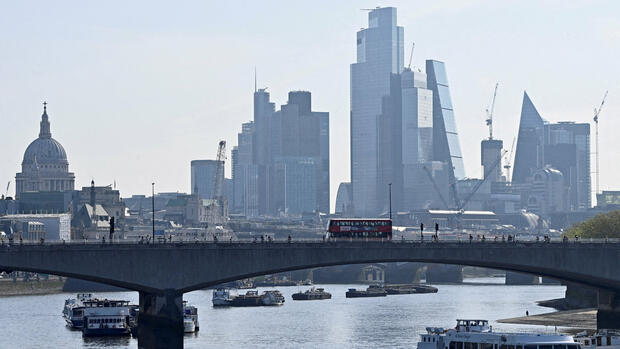The statisticians explained the weaker inflation primarily with lower fuel prices.
(Photo: Reuters)
London UK inflation unexpectedly fell sharply in June to its lowest level in more than a year. Consumer prices rose by an average of 7.9 percent compared to the same month last year, as the statistics office ONS announced on Wednesday in London. This is the lowest value since March 2022.
In May, the inflation rate was still 8.7 percent. Economists surveyed by the Reuters news agency had expected a decline, but only to 8.2 percent. In October 2022, the inflation rate reached 11.1 percent, its highest level in 41 years.
The pound sterling reacted to the weaker inflation with losses against the US dollar and the euro. The background is the expected monetary policy of the British central bank: Due to the still high inflation, further interest rate hikes are expected. However, if inflation falls faster than expected, this could dampen their inclination to raise interest rates further. Higher interest rates boost a currency – and vice versa.
The statisticians explained the weaker inflation primarily with lower fuel prices. Grocery prices have continued to rise, but not as much as in the same month last year. Not only did overall inflation fall, so did inflation excluding energy and food. Many experts consider this so-called core inflation to be more meaningful than the overall rate.
Prices continue to weigh heavily on households
There is no reason for complacency, said Treasury Secretary Jeremy Hunt. The high prices are still a big problem for families and companies. So-called core inflation – which excludes fluctuating energy, food and tobacco prices – also fell in June, falling to 6.9 percent after hitting a more than 30-year high of 7.1 percent in May had.
Persistently high inflation is forcing the Bank of England to tighten interest rates in an attempt to bring inflation closer to its 2% target. The currency watchdogs headed by Andrew Bailey raised their key interest rate for the 13th time in a row in June – from 4.50 to 5.00 percent. Experts assume that interest rates will be raised further in the coming months.
High inflation is also a problem for Prime Minister Rishi Sunak. He has promised to halve inflation over the course of the year. Elections are coming up in the UK next year. “We remain committed to doing whatever we can to halve inflation,” Energy Security Secretary Grant Shapps told Times Radio.
More: Fear of interest rate hikes triggers new turbulence on the British bond market
